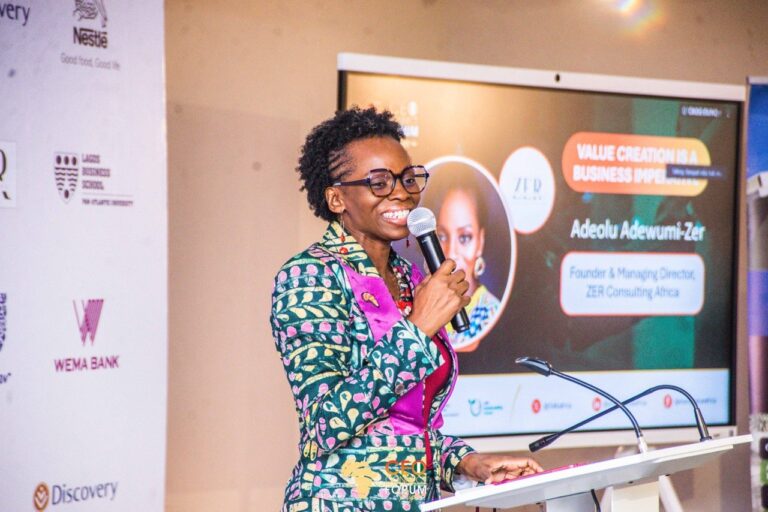Adewumi-Zer Adeolu, a renowned Afro-optimist and global strategist, has spent over 25 years championing African excellence. As the founder of ZER Consulting Africa and the internationally best-selling author of Afro-Optimism Unleashed, Adeolu is dedicated to empowering African leaders and businesses to achieve sustainable growth and meaningful impact. Having successfully led strategic growth initiatives across Africa and globally, Adeolu’s insights have earned her numerous accolades. In an exclusive interview with Kenneth Athekame, she shares her views on Nigeria’s economy, the importance of financial inclusion, and the role of the informal sector in driving growth.
On the Current State of Nigeria’s Economy:
“Nigeria, like many African nations, grapples with economic complexities,” says Adeolu. “While we acknowledge challenges like fluctuating macroeconomic indicators, I remain Afro-optimistic about our underlying resilience. Nigeria has incredible potential for growth, and by building on our strengths, we can overcome these challenges.”
Key Risks and Opportunities for Nigeria:
The next few years will shape Nigeria’s economic future. While risks such as global volatility and internal structural issues remain, Adeolu highlights several opportunities. “Nigeria’s youthful population, its entrepreneurial spirit, and the rapid adoption of technology are major drivers for growth. If we address infrastructure gaps and improve the ease of doing business, we can unlock substantial growth, especially for SMEs.”
Diversifying Nigeria’s Economy Beyond Oil:
Adeolu advocates for diversification, stressing the need for value-added processing and manufacturing. “Agriculture has vast potential for export, and we must develop a robust services sector—driven by technology and innovation—to reduce our reliance on oil.”
Improving the Ease of Doing Business:
To enhance Nigeria’s business environment, Adeolu suggests a multi-pronged approach: simplifying regulations, ensuring policy consistency, and strengthening institutions. She also emphasizes the importance of governance, transparency, and infrastructure investments, particularly in power and transportation.
Addressing Regional Economic Disparities:
“Regional disparities are a real concern,” says Adeolu. “A national strategy must focus on inclusive growth. Targeted investments in infrastructure, education, and healthcare can help bridge these gaps. Promoting inter-regional trade and addressing security challenges will also foster national development.”
Integrating the Informal Economy into the Formal Sector:
With nearly 60% of Nigeria’s economy in the informal sector, Adeolu sees the integration of this sector as critical. “We must create an enabling environment that incentivizes formalization. Simplified registration processes, access to finance, and social protection for informal workers are key to making this transition.”
Expanding Financial Inclusion for SMEs:
Financial inclusion is vital for SME growth, according to Adeolu. “Innovative financial solutions like credit guarantee schemes, mobile technology, and tailored financial products can help expand access to credit. Digital lending platforms and local angel investor networks also present viable pathways to funding.”
Leveraging Technology and Innovation for Growth:
Adeolu underscores the power of innovation and technology in overcoming economic challenges. “Nigerian businesses can leverage tech—especially generative AI—to improve efficiency, reach new markets, and develop solutions to local problems. The growing adoption of mobile payments and e-commerce shows the transformative impact of digital tools.”
Adapting to the Changing Economic Landscape:
Adapting to Nigeria’s rapidly changing economic landscape requires continuous learning, agility, and strategic flexibility. “In a dynamic environment like Nigeria’s, businesses must remain open to experimentation, gather customer feedback, and stay informed about both global and local trends,” she notes.
Nigeria’s Role in the African Economic Landscape:
As one of Africa’s largest economies, Nigeria plays a pivotal role in shaping the continent’s future. “With one in five Africans being Nigerian, our growth significantly impacts the entire continent. Nigeria must foster regional trade, collaborate on infrastructure projects, and demonstrate best practices in governance,” says Adeolu.
Building African Excellence for the Global Stage:
“Building African excellence means showcasing Africa’s best talent, innovation, and creativity globally,” says Adeolu. “Nigeria, with its rich cultural heritage and entrepreneurial drive, is perfectly positioned to lead this effort. Through initiatives like Nollywood and other global cultural exports, we are already making strides in promoting African excellence.”
Cross-Border Collaboration and Trade in Africa:
The African Continental Free Trade Area (AfCFTA) offers immense opportunities for cross-border trade and collaboration. “Nigeria must play a leading role in promoting intra-African trade and economic integration,” Adeolu asserts. “Our large market and industrial base position us to benefit greatly from AfCFTA.”
Consulting and Addressing Africa’s Challenges:
Adeolu’s consulting firm, ZER Consulting Africa, is focused on addressing the region’s social and economic challenges. “Consulting provides expert guidance to governments, businesses, and civil society, helping develop effective strategies for poverty reduction, job creation, and sustainable development,” she explains.
Aligning Personal Values with Purpose-Driven Consulting:
Adeolu’s work with ZER Consulting is aligned with her personal values of empowering African development. “As an Afro-optimist, I believe in the continent’s potential. My goal is to help African leaders and businesses achieve sustainable growth.”
Incorporating Local Knowledge in Strategic Recommendations:
To ensure her strategies are effective, Adeolu integrates local knowledge and perspectives into her consulting work. “By engaging with local stakeholders and understanding the unique challenges and opportunities, we can create solutions that are both innovative and relevant.”
Leading Teams to Achieve Strategic Goals:
“Leading teams in challenging environments requires empathy and clear communication,” Adeolu shares. “Fostering a sense of purpose, resilience, and collaboration is key to achieving strategic goals—even during tough times.”

